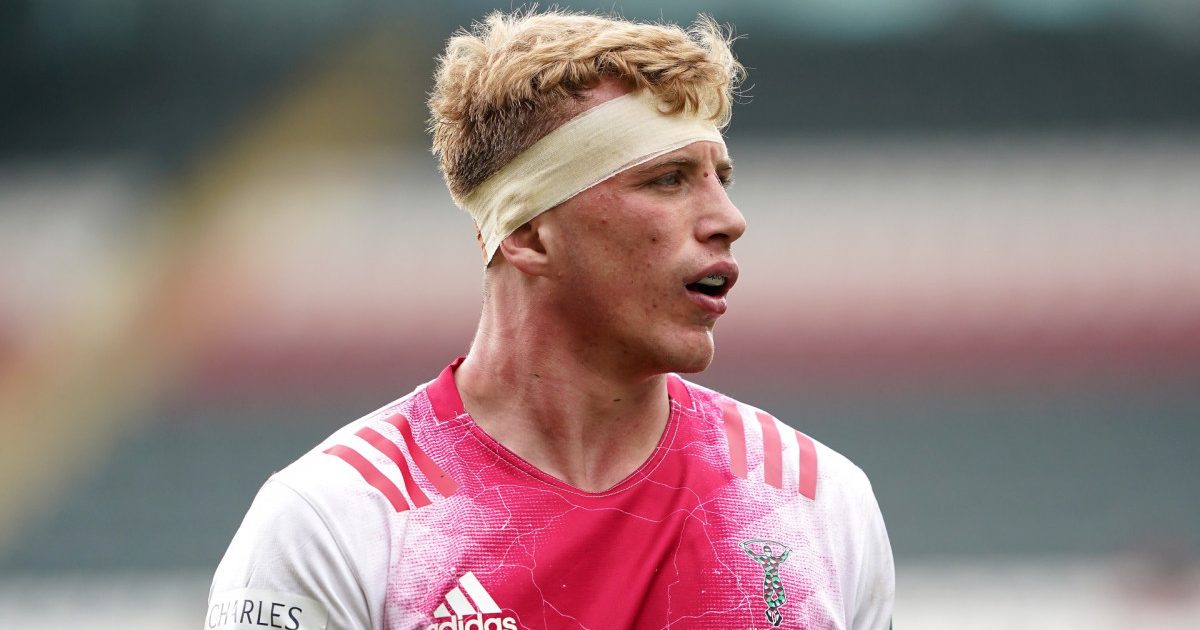'The boys love him, trust him': The 21-year-old rookie back-rower who is suddenly tackling up a storm in Harlequins' Premiership title chase

What Jack Kenningham courageously did for Harlequins fell between the cracks a fortnight ago amid the headlines accompanying the Mike Brown red card and the hoopla generated by Marcus Smith’s latest buzzer-beating try heroics for the Gallagher Premiership semi-final bound Londoners.
Only the anoraks would be fully clued into what has been going on in recent times, last month’s season-ending injury to Will Evans suddenly opening up an enchanting vista to a 21-year-old whose claim to fame for 2020/21 should have only been the fact that he made a late February Premiership debut when the club opted to give some of the high-flying regulars a rare breather.
Kenningham was excellent that day at Newcastle in the eye of a storm that was a gallant 25-22 defeat, making a chart-topping 16 tackles and winning two turnovers in a maiden outing that impressed the likes of Harlequins assistant Jerry Flannery – “I thought Jack had a great game” – and left management regretting in no way the wholesale changes they had rung to a side that had been enjoying a four-game winning streak since the rushed January exit of Paul Gustard.
A pair of lesser profile appearances off the bench followed for the youngster against Northampton and Worcester, nine tackles made in 43 minutes, before Kenningham’s value to Harlequins and his positioning in the pecking order was transformed by the anguished season-ending injury suffered by breakdown-demon Evans at London Irish.
That injured happened in the 31st minute at Brentford and Kenningham’s involvement off the bench was followed by consecutive starts versus Wasps and Leicester where the only setback was the necessity for the head injury assessment that ended his activity at Welford Road with 24 minutes remaining last weekend.
The latest @TheRugbyPod had Andy Goode at his speculative best regarding the Harlequins vacancy following a chance encounter last Saturday with Billy Millard https://t.co/e6OUFbdtiP
— RugbyPass (@RugbyPass) May 20, 2021
All told he has now made six Premiership appearances, three as a starter, managing a lung-bursting 72 tackles in 308 minutes where he has secured three turnovers. His industry on the ball is far less noticeable, the statistics section of the Premiership website crediting him with just an eleven-metre gain from 17 carries in the three top-flight matches that he started.
But making things happen in possession isn’t his priority in replacing Evans, who signed off with a chart-topping high of 29 turnovers, 14 more than next-best Josh Bayliss of Bath. Evans’ tackle count was none too shabby either, his 175 total making him the tenth busiest in the Premiership this term on a list headed by Lewis Ludlow’s 259 for Gloucester.
Eleven points ahead of fifth-place Northampton with just three rounds of regular season fixtures remaining, the upcoming games versus Bath, Sale and Newcastle offer Kenningham the opportunity to try and further accelerate his sudden emergence at Harlequins before the anticipated semi-final, most likely against Bristol, on the weekend of June 18.
How Kenningham goes will be interesting if he is the player that general manager Billy Millard relies on to see out the campaign in the No7 jersey. “It is critical we produce more Jacks,” said Millard when asked by RugbyPass about the rookie whose club website stats describe him as a 94kg back-rower who is 6ft 2ins tall. It turns out in reality he is 12kgs heavier than that.
“He is an amazing kid who grew up as a Harlequins fan, came through the pathway system and even though he is young and new, since I have been here (in 2018) he has been front and centre in grinding away behind the scenes. Whether he is playing on a Monday night or playing for his club or down in Bath University, he always pictures. He has only got one speed and he has developed and physically matured. The boys love him, they trust him and he has taken the opportunity with both hands.
“We have got a good group in our academy and it is an area we are looking to review and do better because it is critical. You get guys like Jack who have been in the system who have got that Quins DNA and they love for the club.
“When they come into the senior group you don’t have to wait – they have got it from day one. It’s such a critical area of the pathway that we keep bringing guys through with the right mindset to push those first-team guys as quickly as possible.”
'I never intended to be as honest as I was in that conversation'@scottbaldwin2 's gambling addiction started properly in Italy and went unnoticed for years, but his house of cards eventually collapsed, writes @heagneyl 👨💻https://t.co/10PPbghSF0
— RugbyPass (@RugbyPass) May 16, 2021





























